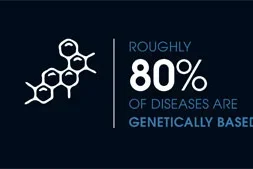About Us
Mission Statement
The California Center for Rare Diseases at UCLA is a collaborative home for physicians, scientists and patients dedicated to improving diagnostics and clinical care, basic understanding, and novel treatments for rare genetic diseases.
Vision
The California Center for Rare Diseases at UCLA is created within the UCLA Institute for Precision Health to form a nexus to develop new methods for understanding, diagnosing and treating rare diseases and to apply this knowledge to make fundamental scientific advances with broad implications for human health. Rare diseases are chronic diseases that individually affect only 1 in 5000 people or fewer, which while individually rare, are quite common when considered as a group. There are over 7000 known rare diseases, which altogether affect about 8% of the world’s population. In California, over 3 million patients have a rare disease. The vast majority of these diseases are caused by genetic mutations and have no treatments. Most doctors are unaware of these diseases and many patients go years without a diagnosis, making the diagnosis and care of these patients a tremendous unmet need. Translational work in rare diseases has been challenging due to small populations, and requires deep expertise to develop the appropriate clinical environment, appropriate translational networks, and develop approaches to test new therapies in clinical trials.

Investigators of the California Center for Rare Diseases at UCLA (CCRD) work to improve diagnosis, understanding, and treatment of neurodevelopmental disorders, cancer predisposition, metabolic disorders, skeletal dysplasias, muscle diseases, and immune disorders, and have enabled clinical trials of precision medicines at UCLA ranging from mutation specific DNA and RNA therapeutics for Duchenne muscular dystrophy to repurposing of FDA-approved drugs in immune disorders based on observed molecular defect in a single patient. There is a rich history of diagnostic improvements and improved understanding of rare diseases at UCLA as a result of founding of the Center for Duchenne Muscular Dystrophy (CDMD) in 2007, Clinical Exome Sequencing since 2011, the formation of the Undiagnosed Diseases Network Clinical Site in 2014, the CARING Clinic to understand rare neurodevelopmental disorders, and the transition to UCLA of the International Skeletal Dysplasia Registry in 2017 to discover new diseases. Each of these rare disease programs have empowered substantial and ongoing novel discovery and created a pathway toward further improvements in treatment and care. The CCRD builds on the success of these diverse programs, to maximize their impact in order to usher in a new era of cutting edge drug discovery, translational science, and precision genetic medicines for rare diseases. The CCRD aims to transform the lives of California families impacted by rare diseases and improve rare disease care worldwide.
Goals
- Improve care for those affected by rare diseases
- Reveal fundamental biological principles of rare diseases that enable therapeutic insights
- Develop the next generation of bioinformatics and molecular diagnostic tools to more rapidly reveal the molecular basis of rare and unrecognized genetic diseases.
- Bridge complex ongoing clinical care with researchers to accelerate progress in rare disease understanding via facilitating access to human bio-specimens and genetic data linked with clinical and clinical trial data.
- Partner academic researchers at UCLA with industry to advance therapeutic candidates through pre-clinical models, translational research, and clinical trials
- Expand clinical trials for rare diseases and develop innovative clinical trial designs for more efficient and effective treatment testing in rare diseases with master protocols and “N of One” studies demonstrating deviation from prior clinical pattern.
- Develop a program to train a new generation of investigators, physicians, genetic counselors in the complexities of genomic medicine and who will bring creative new energy to address the needs of patients with rare diseases.
- Advocate for rare diseases through close cooperation with leading extramural advocacy organizations, to communicate findings and educate the lay and medical communities.
